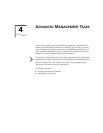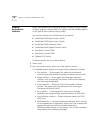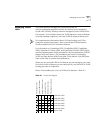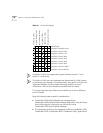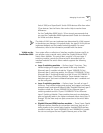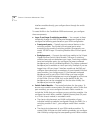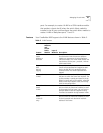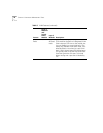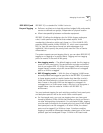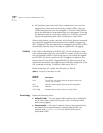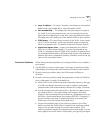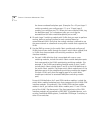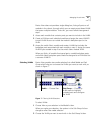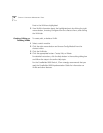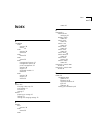
46 C
HAPTER
4: A
DVANCED
M
ANAGEMENT
T
ASKS
■
For backplane ports and switch fabric module ports, you must use
tagging when these ports are shared by multiple VLANs. (Only
one
VLAN’s backplane ports can be untagged; in all other VLANs defined
across the backplane, the backplane ports must be tagged.) If you tag
the backplane port of a switching module for a VLAN, you must also
tag the corresponding switch fabric module port in that VLAN.
Devices (end stations, routers, switches, and so forth) that are connected
to an explicitly tagged front-panel port must be capable of supporting
802.1Q tagging. If the front-panel port is untagged in the VLAN to which
they belong, however, they do not have to support 802.1Q tagging.
VLAN IDs
Each VLAN is identified by its VLAN ID (VID). For the VLANs you create,
each module keeps track of its used VLAN ID numbers to help you select
the next available VLAN ID. Data frames sent by the module are tagged
per IEEE 802.1Q (which contains the VID) if tagging is enabled on the
transmit port for that VLAN. Tagged IEEE 802.1Q data frames that are
received on the module are assigned to the VLAN that corresponds to the
VID contained in the tag. The default VLAN uses a VID of 1.
Before assigning a VID, review the information in Table 6.
Table 6 Assigning ID Numbers to VLANs
Terminology
Review the following terms:
■
Default VLAN
— The port-based VLAN interface that is predefined
on all Switch Fabric ports and the ports of each switching module
without any tagging.
■
Protocol suite
— On Layer 3 modules, refers to the protocol family
associated with a protocol-based or network-based VLAN. The
protocol suite is unspecified for the default VLAN and all
port-based VLANs.
VLAN ID
Number Description
VID 0 The null VID. You cannot define or configure VLANs with
an ID of 0 on a module.
VID 1 Default VLAN assigned by IEEE and 3Com Corporation
VID 4095 Reserved
VID 2–4094 Numbers that you assign when you create VLANs



